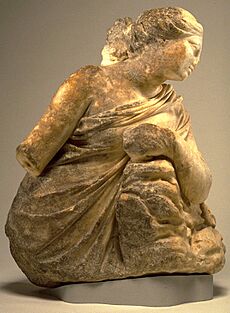Mouseion facts for kids

The Mouseion of Alexandria was a famous place of learning in ancient Alexandria, Egypt. It was like a big research center and library, thought to be started by Ptolemy I Soter and his son Ptolemy II Philadelphus. The word mouseion originally meant a place dedicated to the Muses, who were goddesses of arts and sciences. This is where we get our modern word "museum" from!
The Ptolemy kings wanted to gather the smartest people and all the books in the world. They created the Mouseion and its huge Library of Alexandria to make Alexandria a center of knowledge.
Contents
History of the Mouseion
Founding a Place for Scholars
The Mouseion was likely founded by King Ptolemy I Soter, but it really grew under his son, Ptolemy II Philadelphus. It was a special community where scholars could live and work, protected by the Muses. The royal family and later Roman emperors supported it for many centuries.
More Than a Modern Museum
Unlike today's museums, the Mouseion didn't display art like paintings or sculptures. Instead, it was a place for serious study and research. Think of it like a very old version of a top university or a special institute for advanced thinkers. It attracted some of the brightest minds from the ancient world.
Life as a Scholar
We don't know exactly how many scholars lived at the Mouseion. However, it seems they were paid by the government and didn't have to pay taxes. They also received free housing, food, and even servants. This allowed them to focus completely on their studies and discoveries.
Scholars at the Mouseion did many important things. They studied and corrected ancient Greek writings, like those by Homer and Hesiod. They also translated texts from languages like Egyptian, Assyrian, and Persian into Greek. Their work helped preserve many classic stories and ideas that we still read today.
What the Mouseion Looked Like
Buildings and Gardens
Around the first century AD, a Greek writer named Strabo described the Mouseion. It was part of a larger, beautiful complex of buildings and gardens. It had a covered walkway, a hall with seats, and a large dining room. In this dining room, scholars would eat together and share their ideas.
Spaces for Learning
The Mouseion probably also had private study rooms, living areas, and lecture halls. We don't know if it had special rooms for studying the human body or for looking at the stars. Later, a smaller library was built nearby in the Serapeum. This second library might have been open to more people than just the Mouseion scholars.
Decline and End
Troubled Times
During the rule of King Ptolemy VIII Physcon, Egypt faced many problems. There were wars and political unrest. Many smart people were forced to leave Alexandria or were killed. The last known head librarian of the Library of Alexandria, Aristarchus of Samothrace, had to leave in 145 BC.
Parts of the library collection were also damaged by fire during a battle in 47 BC. Even though the Mouseion continued under Roman rule, it never became as great as it once was.
The Final Years
The last clear mentions of the Mouseion working are from the 260s AD. The palace complex that included the Mouseion was likely destroyed by fire around 272 AD. This happened during the orders of Emperor Aurelian. We don't know exactly how much of the original buildings were still standing then.
Some later writings suggest a similar institution might have existed in the 4th century. However, it probably didn't have the same resources as the original Mouseion.
Legacy of the Mouseion
Preserving Knowledge
The Mouseion was founded during a time when Greek culture was changing from spoken stories to written ones. The scholars there played a huge role in saving and creating important historical, literary, and scientific works. Thanks to their efforts, we can still read the works of Homer and other ancient writers today.
Famous Scholars and Their Work
Many brilliant people worked at the Mouseion, including:
- Callimachus: A poet who created the first complete book catalog.
- Zenodotos: The first head librarian, who started the study of Homer's poems.
- Apollonius of Rhodes: An epic poet known for his story Argonautica.
- Eratosthenes of Cyrene: A head librarian and a genius who studied many subjects. He even figured out a way to find prime numbers and measured the Earth's size.
- Aristarchus of Samothrace: A famous grammarian who invented special signs used in editing texts.
- Didymos of Alexandria: Known for writing over 4,000 commentaries on classical authors.
The Word "Museum"
Because the Mouseion was a place dedicated to the Muses and learning, its name became the root for our modern word "museum". In early modern France, it meant both a group of scholars and their collections. These collections were often called "cabinet of curiosities".
Images for kids



